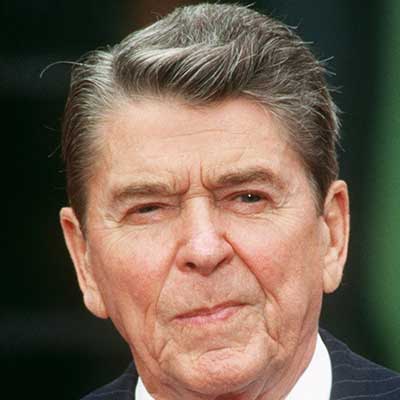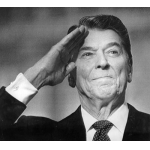Reagan, Ronald Wilson
Fatemeh Daftari
232 بازدید
Ronald Wilson Reagan (1911–2004) was the 40th President of the United States, whose presidency coincided with the Iran-Iraq War. Born in 1911 in the United States, Reagan graduated from Eureka College and worked as a sports broadcaster for several regional radio stations from 1932 to 1937. In 1937, he moved to California and became a well-known film actor, appearing in fifty movies up until 1962. He served as the president of the Screen Actors Guild from 1947 to 1952.[1]
At the 1980 Republican National Convention, Reagan ran for the presidential nomination against George Herbert Walker Bush. After defeating his Democratic rivals, he won the 1981 election and became the President of the United States.[2] Reagan's presidency began with the release of U.S. embassy staff in Iran, who had been taken hostage by Muslim Student Followers of the Imam’s Line on November 4, 1979. The hostages' departure from Tehran on January 20, 1981, coincided with Reagan's inauguration.[3]
Reagan’s campaign slogan focused on restoring America’s superiority over the Soviet Union and enhancing its influence in the Third World. To that end, despite declaring U.S. neutrality in the Iran-Iraq War, Reagan openly stated that he could not remain indifferent to the war's outcomes. Consequently, he sided with Iraq, providing the country with both financial and military support.[4] He removed Iraq from the list of countries accused of supporting terrorism and supplied Kuwait and Iraq with various weapons. Additionally, he reneged on a deal made by his predecessor, Jimmy Carter, to deliver $240 million worth of military spare parts that had been withheld from Iran. Shortly after Reagan’s inauguration, U.S. Secretary of State Alexander Haig announced that the United States would not deliver any military equipment under previous commitments or future requests to Iran.[5] The U.S. Department of State also launched Operation Staunch to stop the flow of U.S. arms and military equipment from other countries to Iran.[6] Furthermore, to increase pressure on Iran, Reagan pushed oil-producing countries to lower oil prices and imposed sanctions on importing Iranian oil.[7]
While the U.S. actively banned international trade with Iran, on May 25, 1986, a secret delegation led by Robert McFarlane, a CIA analyst and Reagan’s advisor, was sent to Tehran with a shipment of spare parts for Hawk missiles.[8] The delegation signed a deal with Iranian officials to address bilateral issues. However, despite efforts to keep the negotiations secret, the American ABC television channel exposed the matter on November 4 of the same year. Initially, Reagan tried to deny the deal, claiming, "We never give anything to terrorists because it would only promote terrorism."[9] However, he was eventually forced to admit to the deal. Subsequently, his National Security Advisor and his deputy were dismissed, and Robert McFarlane attempted suicide by swallowing a large number of Valium pills.[10]
Despite sanctions, Reagan could not achieve his objectives. In a speech on November 15, 1986, he acknowledged that peace in West Asia and ending the war could not be achieved without reaching an agreement with Iran. Nevertheless, he engaged in direct military action against Iran.[11]
On April 20, 1987, amid the escalation of the Tanker War in the Persian Gulf, Kuwait requested the U.S. to protect Kuwaiti oil tankers. In response, on May 21, the U.S. agreed to the request, and Kuwaiti ships were re-registered under the U.S. flag. In line with this policy, on October 19, the U.S. bombarded the Iranian Reshadat (Rostam) oil platform with four warships, causing $500 million in damage to Iran, in retaliation for a missile attack on two tankers at Kuwait’s oil terminal.[12]
In September 1987, six American helicopters attacked the Iranian commercial vessel "Iran Ajr," claiming it was laying mines in the Persian Gulf. The attack resulted in the martyrdom of three Iranian crew members.[13] On October 9, 1987, American helicopters attacked four Islamic Revolutionary Guard Corps Navy patrol boats, Martyring and wounding several guardsmen. The Iranian government strongly condemned the U.S. actions,[14] and even former U.S. President Jimmy Carter publicly criticized the policies Reagan adopted towards the Persian Gulf.[15]
However, these protests did not change Reagan's strategy in the region. In 1988, U.S. warships attacked the Sasan, Reshadat, Salman, and Mubarak oil platforms, as well as the Iranian warships Sahand, Joushan, and Sabalan, in the Persian Gulf.[16] On May 15, 1988, the U.S. also joined Iraq in attacking the Larak oil terminal in the Persian Gulf.[17]
U.S. hostility toward Iran reached its peak on July 1, 1988, during a naval clash between U.S. and Iranian forces in the Persian Gulf. Subsequently, on July 3, the U.S. Navy shot down an Iranian Airbus passenger plane over the Persian Gulf, killing all 290 people on board.[18]
On November 11, 1988, Reagan's eight-year presidency came to an end, and George H. W. Bush succeeded him, continuing Reagan's policies in the region.[19] Ronald Reagan died of pneumonia, complicated by Alzheimer's, on June 5, 2004.[20]
[1] Daneshgostar Encyclopedia, Vol. 9, Tehran: Daneshgostar Rooz Scientific and Cultural Institute, 2010, p. 104.
[2] Toloei, Mahmoud, Comprehensive Political Dictionary, Tehran: Elm Publishing House, Vol. 2, 1998, p. 294.
[3] Tayarani, Behrouz, A Diary of Iran-America Relations, Tehran: Center for Diplomatic Documents and History, 1990, p. 294; Daneshgostar Encyclopedia, Vol. 9, p. 104.
[4] Asadian, Amir, American Security Policy in the Persian Gulf, Tehran: Strategic Studies Research Institute, 2002, pp. 107-110.
[5] Ibid., pp. 107 and 108.
[6] Tayarani, Behrouz, Daily Journal of Iran-US Relations, p. 308.
[7] Ghazanfari, Kamran, Interventions, Vol. 4 (Nimeh PeNehan 56), Tehran: Keyhan Publishing Company, 2015, p. 72.
[8] Tayarani, Behrouz, Daily Journal of Iran-US Relations, p. 323.
[9] Ibid., pp. 329 and 330.
[10] Ibid., pp. 333 and 334.
[11] Ibid., p. 331.
[12] Toloei, Muhammad, Sad Sal Sad Chehreh (Illustrated History of the Twentieth Century), Tehran: Elm Publishing, 1999, pp. 1029 and 1030.
[13] Ghazanfari, Kamran, Modakhelat (Interventions), Vol. 4, p. 69.
[14] Ibid.; Tayarani, Behrouz, Daily Journal of Iran-US Relations, p. 337.
[15] Tayarani, Behrouz, Daily Journal of Iran-US Relations, p. 337.
[16] Ghazanfari, Kamran, Modakhelat (Interventions), Vol. 4, p. 70.
[17] Ibid
[18] Ghazanfari, Kamran, Modakhelat (Interventions), Vol. 4, p. 70.
[19] Danesh Gostar Encyclopedia, p. 104.
[20] Young Journalists Club, 2013, June, 5, news code 4412209.





